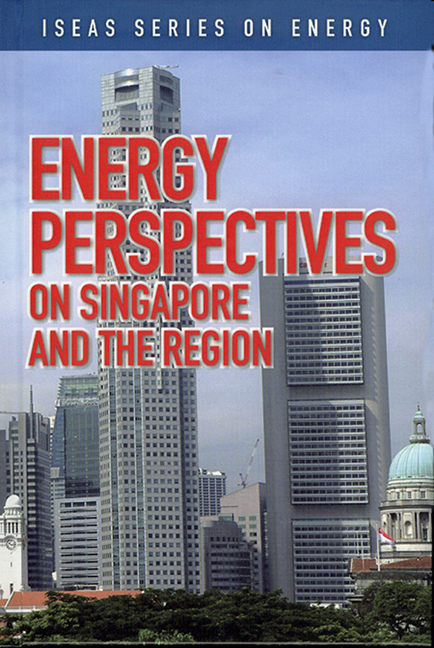Book contents
- Frontmatter
- Contents
- Foreword
- Preface
- The Contributors
- 1 Overview of Singapore's Energy Situation
- 2 Singapore's Changing Landscapes in Energy
- 3 Singapore's Role as a Key Oil Trading Centre in Asia
- 4 Large-Scale Solar PV Power Generation in Urban High-Rise Buildings in Singapore
- 5 The High-Carbon Story of Urban Development in Southeast Asia
- 6 Renewable Energy and the Environment: Technology and Economic Perspectives
- 7 Delivering Results in a Booming Rig Market
- 8 The Success Story of Rig Building in Singapore
- 9 The Singapore Oil Situation
- 10 Singapore Petroleum Company: Adding Value to the Singapore Oil Industry
- 11 Oil Storage: The Singapore Story
- REGIONAL and INTERNATIONAL
- 12 The Outlook for Energy: A View to 2030
- 13 India's Energy Situation: The Need to Secure Energy Resources in an Increasingly Competitive Environment
- 14 The Implications and Impacts of China's Oil Demand on the Asia Pacific
- 15 Energy Security Cooperation in Asia: An ASEAN-SCO Energy Partnership?
- 16 China's Energy Security: Geo-politics versus Interdependence
- 17 The Strategic Challenges for the United States and China in Global Energy Supply
- 18 China's Coal: Curse or Blessing
- 19 Japan's New Energy Strategy
- 20 Who Wins in the Asian Scramble for Oil?
- 21 New Horizons for Liquefied Natural Gas (LNG) East of Suez
- 22 Bio and Synthetic Fuels: An Alternative for Sustainable Mobility
- 23 Price Discovery for Middle East Refined Product Exports: A Natural Role for Dubai
- 24 The Outlook for Gas in Southeast Asia
- 25 Sakhalin-2 Project, a New Energy Source for the Asia Pacific: History in the Making
- Index
17 - The Strategic Challenges for the United States and China in Global Energy Supply
from REGIONAL and INTERNATIONAL
Published online by Cambridge University Press: 21 October 2015
- Frontmatter
- Contents
- Foreword
- Preface
- The Contributors
- 1 Overview of Singapore's Energy Situation
- 2 Singapore's Changing Landscapes in Energy
- 3 Singapore's Role as a Key Oil Trading Centre in Asia
- 4 Large-Scale Solar PV Power Generation in Urban High-Rise Buildings in Singapore
- 5 The High-Carbon Story of Urban Development in Southeast Asia
- 6 Renewable Energy and the Environment: Technology and Economic Perspectives
- 7 Delivering Results in a Booming Rig Market
- 8 The Success Story of Rig Building in Singapore
- 9 The Singapore Oil Situation
- 10 Singapore Petroleum Company: Adding Value to the Singapore Oil Industry
- 11 Oil Storage: The Singapore Story
- REGIONAL and INTERNATIONAL
- 12 The Outlook for Energy: A View to 2030
- 13 India's Energy Situation: The Need to Secure Energy Resources in an Increasingly Competitive Environment
- 14 The Implications and Impacts of China's Oil Demand on the Asia Pacific
- 15 Energy Security Cooperation in Asia: An ASEAN-SCO Energy Partnership?
- 16 China's Energy Security: Geo-politics versus Interdependence
- 17 The Strategic Challenges for the United States and China in Global Energy Supply
- 18 China's Coal: Curse or Blessing
- 19 Japan's New Energy Strategy
- 20 Who Wins in the Asian Scramble for Oil?
- 21 New Horizons for Liquefied Natural Gas (LNG) East of Suez
- 22 Bio and Synthetic Fuels: An Alternative for Sustainable Mobility
- 23 Price Discovery for Middle East Refined Product Exports: A Natural Role for Dubai
- 24 The Outlook for Gas in Southeast Asia
- 25 Sakhalin-2 Project, a New Energy Source for the Asia Pacific: History in the Making
- Index
Summary
In the five years since the turn of the millennium, the world has grown to realize that the defining rivalry of the twenty-first century may not be overtly religious or ideological, but overtly economic. It now seems that the definitive competition of the next 100 years will not be between Christianity and Islam, as many had thought in the post Cold War era of the late twentieth century. It will not likely be between communism and capitalism, at least not as ideologies. The rivalry that will shape the world will likely be between the world's lone super power, the United States of America, and the only nation- state capable of challenging its economic and political supremacy within the next generation, China.
This growing awareness is evident in the popular media, where generous amounts of space in broadcast, print and online media have been devoted to answering the question, “Does The Future Belong To China?” as Newsweek recently put it. There are many different ways to answer that question, most of which are beyond the scope of this chapter. But one way is to look more closely at the consequences of China's growth for the global energy industry, and in particular on the global oil and gas markets. Since the 1880s, the oil market has acted as a crucible where international relationships have been forged and broken. By examining the international oil markets, it is possible to gain a better understanding of the relationships between the leading actors on its stage — and a better feel for the rise and fall of nations.
Since the end of World War I, when industrialized nations shifted from coal to oil as a key transportation fuel in military use, the drive to control oil as a strategic commodity has defined the ambitions of nations.
- Type
- Chapter
- Information
- Energy Perspectives on Singapore and the Region , pp. 197 - 219Publisher: ISEAS–Yusof Ishak InstitutePrint publication year: 2007



